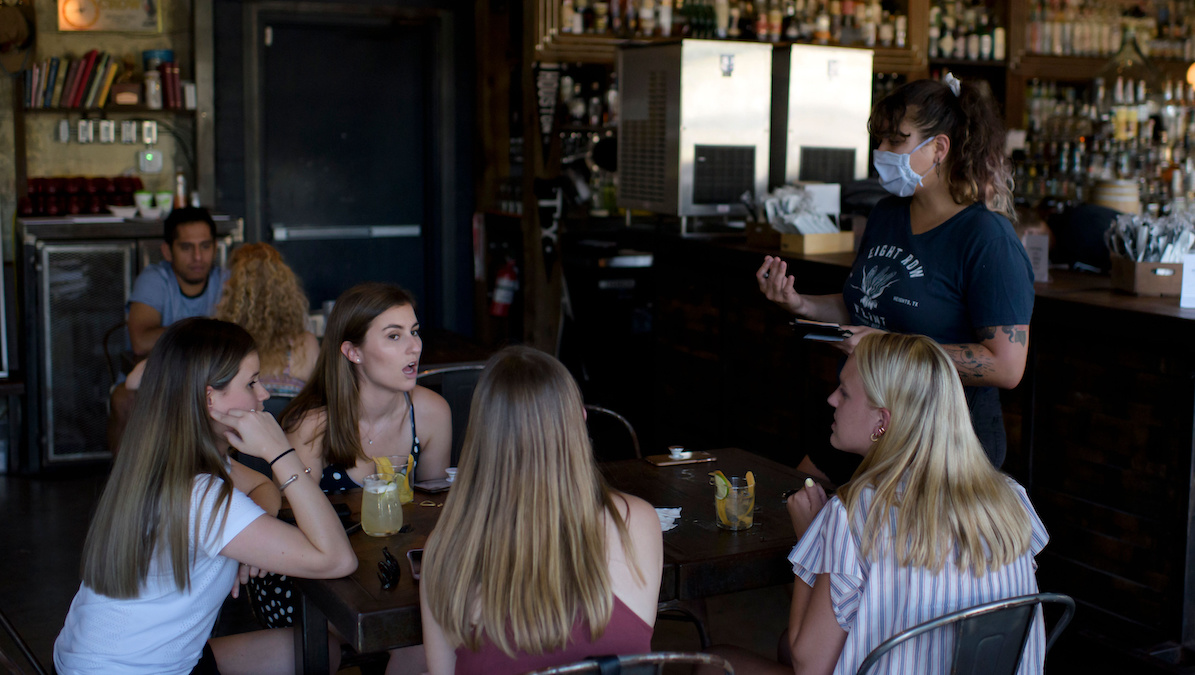
Younger People Now Driving Spikes in New Coronavirus Cases

A server wearing a face mask takes orders from a table of customers at Eight Row Flint in Houston, Texas on May 22, 2020. MARK FELIX / AFP / AFP via Getty Images
The rush to reopen states across the South and the Sun Belt has led to a surge in coronavirus cases. Public health officials are now noticing that people in their 20s and 30s seem to be driving the spikes in the infection rate across Florida, Georgia, South Carolina, Texas, Arizona and other states as CNN reported.
Data from Johns Hopkins University finds that at least 23 states are seeing a rise in new cases compared to the previous week. Ten of those 23 reported more than a 50 percent spike, including the first states to start reopening.
Public health officials have lamented the resistance to social distancing orders in those states. In Mississippi, for example, officials pinpointed a surge in cases due to fraternity rush parties at the University of Mississippi, according to CNN.
Officials in South Carolina warned that a rising number of people under 30 were testing positive for coronavirus, with an official at the local department of health saying that the rise shows “younger South Carolinians are not taking social distancing seriously,” according to Forbes.
The rise in cases in clusters of young people has also been observed in California, Washington, Colorado, Wisconsin and North Carolina, according to NPR.
As Forbes reported, the chief medical officer at Georgia’s largest hospital, Dr. Robert Jansen, told the local press that he was seeing more patients in their 20s and 30s: “What frightens me is not only that they are younger, the potential of them infecting other people, particularly parents and grandparents.”
Texas Governor Gregg Abbot attributed the rise in cases in his state to bar-type settings where young people have congregated since Memorial Day weekend, according to The Hill.
“What we’re seeing there is that people of that age group, they’re not following these appropriate best health and safety practices,” Abbott said in an interview this week with KLBK, a McAllen television station, as The Hill reported. “They’re not wearing face masks. They’re not sanitizing their hands. They’re not maintaining the safe distancing practices. And as a result, they are contracting COVID-19 at a record pace in the state of Texas.”
In Washington state, where the virus’s arrival in the U.S. was first detected, the number of hospitalizations among older people has continued to fall even as the number of new cases has started to rise, according to NPR.
“This creates a reservoir of disease moving around in the population, simmering, if you will,” said Judith Malmgren, an epidemiologist at the University of Washington to NPR. “This can spike to uncontrollable levels in more vulnerable adults very quickly.”
The growing trend suggests that young people feel complacent with social distancing guidelines and recommendations to wear masks. They feel that the statistics suggest the coronavirus will not negatively affect them, which is worrisome since many hold front-line service jobs that put them in contact with many people, as The Hill reported.
“We need to change our whole thinking about COVID-19 during this stage of the pandemic,” said Dr. Thomas Tsai, a professor at the Harvard T.H. Chan School of Public Health, to NPR. “It’s difficult to contain the virus physically because you have younger individuals, who may be pre-symptomatic or mildly symptomatic, who are going about their normal lives and reengaging with society.”
Tsai suggested that making tests more available, effectively employing contact tracing, and pushing people to wear face masks is the key to stopping the spread, instead of a new round of lockdowns.
“Arguably, this is even more important now because we’re no longer motivated to follow public health guidance by images of people lining up outside the hospitals in New York,” he told NPR. “It needs to be a more personal approach.”
- Rural America Could Be Hard Hit by COVID-19 - EcoWatch
- Florida Breaks U.S. Daily Record With Over 15,000 New Coronavirus Cases - EcoWatch
- As Coronavirus Cases Surge, Georgia Gov. Sues to Stop Atlanta Mayor From Requiring Masks in Public - EcoWatch
- Florida Becomes Second State to Exceed New York's Coronavirus Count - EcoWatch
- Young People Are Primary Coronavirus Spreaders, WHO Warns - EcoWatch

 233k
233k  41k
41k  Subscribe
Subscribe 